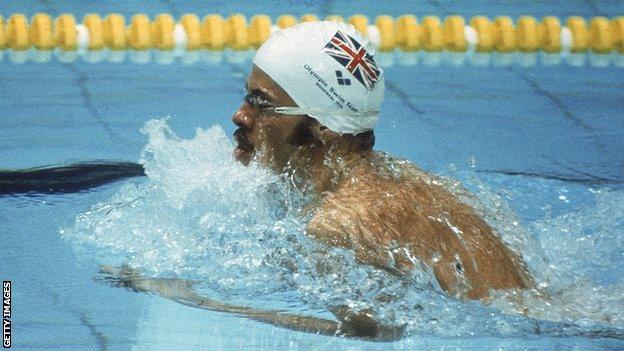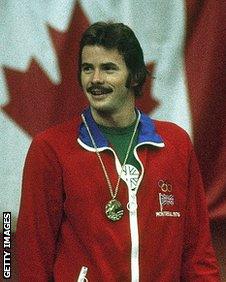Golden Scots: David Wilkie in Montreal, 1976
- Published

David Wilkie, Montreal Olympics, 1976
At the Montreal Olympics, David Wilkie rounded off an illustrious career by winning the first British men's swimming gold for 68 years.
For those of a certain age, the image of Wilkie on the podium wearing his red, white and blue tracksuit immediately revives memories of 1976's long, hot summer.

David Wilkie on the podium at Montreal, 1976
After winning the Olympic gold in the 200m breaststroke at the Montreal Olympics, external in 1976, he retired. In the public eye, he will forever remain 22 years old.
The tall, Edinburgh-based student crossed the Atlantic to train and study in Florida and picked up the accent.
Wilkie brought a laid-back temperament to his sport, even though he was competing at the highest level, winning medals and breaking world records.
Wilkie's father worked on a tea plantation and his parents had moved to Sri Lanka before he was born.
Early days
Born in 1954, Wilkie spent his first 11 years in Sri Lanka.
As a child he would stay in the pool for hours on end or go to the beach and swim in the sea.
He returned to Scotland to attend boarding school at Daniel Stewart's College in Edinburgh.
His time in Edinburgh brought him to the Warrender Club, external. Warrender was, at that time, famous for developing young swimmers.
Wilkie's attitude could have brought his fledgling career to an early end. He struggled to get out of his bed to make the early morning training sessions.
But, when Wilkie was only 12, the club's coach Frank Thomas spotted something in the ex-pat, although it was not until 1970 that the promising swimmer began to shine.
Between 1969, when he won the Scottish Junior title, and 1970, when he won bronze at the Edinburgh Commonwealth Games, external, Wilkie shaved 30 seconds off his time in the 200m breaststroke.
Munich 1972
Wilkie wore a swim cap during the Commonwealth Games, making him the first elite swimmer to wear one in a major competition.
He was said to be the first swimmer to wear both cap and goggles in order to maximise the streamline effect within the water.
It was his performance at the 1972 Munich Olympics, external, when the 18-year old came from virtually nowhere to take a bronze medal, that he began to really show what his real potential.
The performance won him more than an Olympic medal.
The University of Miami, external, who had been monitoring his progress, decided to offer him a sports scholarship which enabled him to train every day whilst studying marine biology, although he soon switched to a degree in English and mass communication.
He said in a BBC interview in 1976, while at college in the US: "I will always remain Scottish, no matter what happens, even though my accent changes, even though I live in this country, I still maintain I am Scottish."
Not surprisingly he thrived under the American scholarship system. In Miami, Wilkie trained intensively in the Olympic-sized outdoor pool daily.
In the days when Olympics were still strictly for amateurs, being allowed to dedicate himself to his sport brought the best out in Wilkie.
In 1973 he went to Belgrade and won the World 200m breaststroke title, breaking the world record, and then regaining the title in 1975, while also winning in the 100m breaststroke.
At the Commonwealth Games in Christchurch, external in 1974 he picked up two golds and one silver and also added the European title to his collection that year.
Montreal 1976
Wilkie was the only non-American to win one of the 13 gold swimming medals available at Montreal, the first British man in 68 years to do so.
On the world stage his biggest rival was the American John Hencken., external The two men had an intense rivalry for all the breaststroke titles of the early '70s.
According to the British Olympic coach Dave Haller, Hencken had the beating of him for speed because of his fast arm movements and was more suited to the sprint of the 100m, but Wilkie's long rhythmic strokes meant he was better over the longer distance.
Honours were shared at the Montreal Olympics. Hencken beat Wilkie into second place in the breaststroke with the top three in this race all breaking the world record.
Wilkie was pleased with his second place, especially as he had not prepared as thoroughly as he might by not shaving his body hair, which could cause drag under water.
Over the longer distance, Wilkie dominated, beating Hencken by metres and taking three seconds off the world record.
He retired while at the top, leaving the legacy of being Scotland's best-ever male swimmer.
In 1977 he was appointed MBE.
Golden Scots
Find the stories of other Golden Scots via this link.
- Published30 March 2012